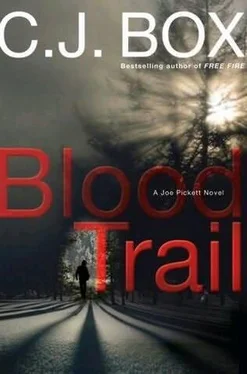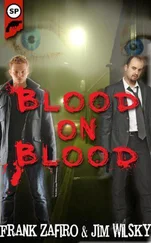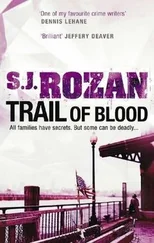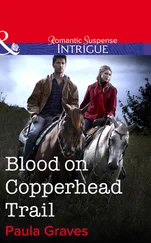It was obvious from Mrs. Thunder’s expression that she was grateful to hear the news but didn’t know who Klamath Moore was.
“I’m so happy to hear that,” she said, growing misty again. “That’s so good to hear. Please, if you see her again, tell her to come by the school. Tell her I’d love to see her again.”
Joe smiled. “If I get the chance, I’ll pass along the invite.”
“Tell her that old Alice Thunder wants to give her a hug.”
JOE WAS buoyed as he walked out into the parking lot. The best entree to Klamath Moore would no doubt be through his wife, Shannon… and Alisha. Maybe that was the angle Nate was working.
If his friend was working on anything at all.
HE SAT in the pickup without starting the motor. His mind raced. What was it Vern Dunnegan had once told him about the Indian camp cook?
Vern told a lot of stories. He talked nonstop. Joe had learned to tune him out because the chatter was incessant and many of Dunnegan’s stories were mean-spirited. Joe had tried to forget everything Vern had told him once Vern showed himself to be a liar and a criminal eight years before; he’d done all he could to expunge Vern Dunnegan from his mind. But he tried to remember this particular story about the camp cook. He hoped he’d written it down in his notebook at the time, and he planned to locate his old notes to try to refresh his memory.
THERE WERE two messages on his cell phone and he punched in the access number to hear them.
The first was from Stella, saying Randy Pope was doing everything he could to meet with the governor to get his blessing to leave Cheyenne and take over supervision of the case. She was running interference, but she said she couldn’t hold him off forever. What, Stella asked, was going on?
The second was from Portenson of the FBI, saying Bill Gordon was prepared to meet Joe that night in the little town of Winchester. He said Gordon wanted to talk and he had something to say. Portenson said Joe was to be at the park promptly at eight. No earlier, no later. If Joe wasn’t there on time and alone, Gordon, Portenson promised, would flee. And if something bad happened-if Joe was late or Gordon smelled a trap-there would be no more meetings, because the informant couldn’t risk them and, frankly, he had no idea if Joe could be trusted in the first place.
“You’ve got one shot at our man,” Portenson said. “Don’t fuck it up.”
Joe was grateful Portenson didn’t mention Nate, which meant he didn’t yet know. But Joe assumed the FBI would know soon, one way or another-possibly even Pope would tell them in an effort to take over-and he wondered if he’d hear the explosion from 350 miles away.
IT WASN’T the new knowledge of Shenandoah Yellowcalf, or the calls from Stella or Portenson that suddenly unnerved Joe, caused the hairs on his forearms and the back of his neck to stand on end, his flesh to crawl. It wasn’t something that had happened or what he’d learned as much as what he was feeling: there was something malevolent in the air.
He was being watched.
Over the years, he’d come to trust his instincts in this regard. When he had felt he was being watched he habitually discarded the notion, convinced himself he was imagining things, tried to move on, only later to learn that he had been correct in the first place.
He raised his eyes, surveyed the cars in the parking lot. No one. He scanned the school grounds, anticipating the sight of a student skulking in the shadows and alcoves, maybe sneaking a smoke, keeping his eyes on Joe. He scanned the windows of the school for a face. Maybe Mrs. Thunder and Mrs. Shoyo looking out at him, seeing him off. Maybe those boys who had been pretending to be “poaching fools” were having another laugh at his expense.
He scanned the sagebrush-covered hillsides that flowed like frozen swells toward the foothills and the mountains beyond. There were pockets of pine and aspen, plenty of vantage points to hide in.
Joe saw no one.
I WATCH the game warden through my binoculars as he leaves the school building. He is wearing his red uniform shirt. He clamps his Stetson on his head and climbs into his green pickup truck. He’s doing something in front of him or on his lap, eyes down. Probably checking a PDA or his cell phone.
Following him wasn’t a problem and I’m sure he never suspected I was there.
The stand of aspen is behind me, the dried leaves rattling in the wind. I’ve parked my vehicle on the side of the old road in back of the trees, so it’s hidden from view. My rifle is beside me, pulled from its case. I estimate 250 yards at most across the flat. It is a clear, sunny day. The wind is so slight it wouldn’t be a factor in aiming.
Two things, though: I don’t like long shots, and killing the game warden now would hurt me more than help me.
Shots at this distance can be problematic. There is no guarantee. I like them much closer; close enough there is no doubt. Beyond the game warden’s pickup is the school, and the windows of the classrooms are at the same height as the windshield of his truck. I’ve heard of occasions when bullets were deflected by glass. If I missed-not likely, but always possible-I could kill a teacher or a student. An innocent.
More important is that I have nothing against the game warden, although I fear in his clumsy way he’s getting closer. I don’t fear the sheriff, or the sheriff’s men in the mountains right now. They’re hunting a ghost. But this game warden has worried me since the first time I saw him. There is something earnest and relentless about him that scares me in a way I can’t articulate. He reminds me of me.
But why would he be at the school, if not to ask about Alisha Whiteplume? Or question the staff about the person once known as Shenandoah? If he makes the connection, it is a big step toward finding out about me. I can only hope in this case I am mistaken. I’m not ready to be found out.
Not yet.
The game warden has frozen up in a way that I think he must know I’m here. I can see a certain stiffness to his movements, an attempt not to give away the fact that he’s looking for me, trying to find the eyes that he feels on him. I wriggle backward on the hill, in case he uses his binoculars or spotting scope.
I wait until I hear him start his pickup and drive down the road. I hear the crunch of his tires on the gravel road.
I don’t need to follow him. I know where he’s going.
PORTENSON HAD said Bill Gordon would be waiting for Joe in the public park at 8 P.M. in the little town of Winchester, population 729, which was eighteen miles northwest of Saddlestring via the interstate north to Montana. Joe was familiar with the park because years before he’d taken Sheridan, Lucy, and Maxine to a local dog show there. Maxine didn’t place in any of the events but was awarded a “Most Unusual Color” consolation certificate that his girls were very proud of and that still hung on the refrigerator with magnets. None of the judges had ever seen a Labrador that had once been scared completely white. Nobody had.
The park consisted of a few picnic tables, a shelter, some benches, and a jungle gym and slide erected and maintained by the Winchester Lions Club, according to a sign. The park was a perfectly square town block. It was sealed off on four sides by neat rows of ancient cottonwood trees, which made it a good place to meet because of its seclusion on a cold fall night and because of its location off the main street.
As instructed by Portenson, Joe wore street clothes-Wranglers, boots, snap-button cowboy shirt, his worn Carhartt ranch coat-and drove the family van instead of his game and fish pickup. Any suggestion that he was official would blow the meeting, expose Gordon if someone saw them together. The interstate was clear of snow but black and wet in his headlights. His twelve-gauge Remington WingMaster shotgun rested against the passenger seat, muzzle down, and his.40 Glock was clipped to his belt and out of view under the coat. He was edgy, unsure, which is why he’d brought his weapons. But he wanted to talk to Gordon. Joe had the feeling-and it wasn’t more than that at this point-that he was getting somewhere, that momentum was finally with him. Not that he was solving the murders or understanding what was going on, but that finally he was in motion toward an end.
Читать дальше












